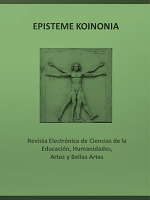Influence of neurodidactics on meaningful learning
DOI:
https://doi.org/10.35381/e.k.v4i7.1083Keywords:
knowledge management, activity learning, educational psychology. (Words taken from the UNESCO Thesaurus).Abstract
The article aims to analyze the influence of neurodidactics in the meaningful learning of students of higher basic education in the province of Manabí - Ecuador. It was developed from a quantitative approach, methodologically it was based on a descriptive correlational study by Pearson with a non-experimental field design. The population sample was made up of 179 teachers. The affirmative hypothesis is rejected and the null hypothesis is accepted, therefore, it is synthesized that neurodidactics influences meaningful learning, however, it must be refined or perfected in its application by teachers to raise the correlation value and enhance the probability that bilateral significance is generated less than 0.05, however, neurodidactics is projected as a favorable and excellent influence to promote meaningful learning.
Downloads
References
Agra, G, Soares-Formiga, N, Oliveira, Simplício-de-Patrícia, C, Lopes-Costa, M, Melo-Fernandes, M, & Lima-da-Nóbrega, M. (2019). Analysis of the concept of Meaningful Learning in light of the Ausubel's Theory. Revista Brasileira de Enfermagem, 72(1), 248-255. https://doi.org/10.1590/0034-7167-2017-0691
Amaya-Amaya, A, & Cuéllar-Cuéllar, A. (2016). Estilos de aprendizaje de los alumnos de posgrado a distancia de la Universidad Autónoma de Tamaulipas [Learning styles of postgraduate distance learning students of the Universidad Autónoma de Tamaulipas]. Apertura (Guadalajara, Jal.), 8(2), 8-21.
Araya-Pizarro, S, & Espinoza-Pastén, L. (2020). Aportes desde las neurociencias para la comprensión de los procesos de aprendizaje en los contextos educativos [Contributions from the Neurosciences for the Understanding of Learning Processes in Educational Contexts]. Propósitos y Representaciones, 8(1), e312. https://dx.doi.org/10.20511/pyr2020.v8n1.312
Benavidez, V, & Flores, R. (2019). La importancia de las emociones para la neurodidáctica [The importance of emotions for the neurodidactics]. Wimblu, Rev. Estud. de Psicología UCR, 14(1); 25-53.
Burgos-Briones, J., Alvarado-Pino, L., & Valdez-Guerrero, R. (2019). Enfoque escolar centrado en el estudiante [Student-centered school approach]. CIENCIAMATRIA, 5(1), 45-58. https://doi.org/10.35381/cm.v5i1.240
Carranza-Alcántar, M. (2017). Enseñanza y aprendizaje significativo en una modalidad mixta: percepciones de docentes y estudiantes [Significant teaching and learning in a blended learning: perceptions of teachers and students]. RIDE. Revista Iberoamericana para la Investigación y el Desarrollo Educativo, 8(15), 898-922. https://doi.org/10.23913/ride.v8i15.326
Collado-Ruano, J. (2017). Interculturalidad y descolonialidad: Retos y desafíos epistemológicos [Interculturality and Decoloniality: Epistemological Challenges]. Revista nuestrAmérica, 5(9), 38-57.
Hernández, R, Fernández, C, Baptista, P. (2010). Metodología de la Investigación (quinta edición). Editorial Mc – Graw – Hill Interamericana. México.
López-Abella, L, & Juanes-Giraud, B. (2020). Flexibilidad curricular en la formación del profesional de la educación física. Revista Universidad y Sociedad, 12(1), 194-201.
Marambio, J, Becerra, D, Cardemil, F, & Carrasco, L. (2019). Estilo de aprendizaje según vía de ingreso de información en residentes de programas de postítulo en otorrinolaringología [Learning styles according to the information entry in otolaryngology post-graduate programs]. Revista de otorrinolaringología y cirugía de cabeza y cuello, 79(4), 404-413. https://dx.doi.org/10.4067/S0718-48162019000400404
Paniagua, M. (2013). Neurodidáctica: una nueva forma de hacer educación [Neurodidactics: a new way of doing education]. Fides et Ratio - Revista de Difusión cultural y científica de la Universidad La Salle en Bolivia, 6(6), 72-77.
Ramos-García, A., & San-Andrés L. (2019). Neurodidáctica y competencias emocionales de estudiantes de educación general básica [Neurodidactics and emotional competencies of basic general education students]. CIENCIAMATRIA, 5(1), 16-29. https://doi.org/10.35381/cm.v5i1.237
Toca-Torres, Claudia E, & Carrillo-Rodríguez, J. (2019). Los entornos de aprendizaje inmersivo y la enseñanza a ciber-generaciones [Immersive learning environments for teaching the cyber generations]. Educação e Pesquisa, 45, e187369. Epub June 19, 2019.https://dx.doi.org/10.1590/s1678-4634201945187369
Vallejo-Valdivieso, P., Zambrano-Pincay, G., Vallejo-Pilligua, P., & Bravo-Cedeño, G. (2019). Estructuras mentales en la construcción de aprendizaje significativo [Mental structures in the construction of meaningful learning]. CIENCIAMATRIA, 5(8), 228-241. https://doi.org/10.35381/cm.v5i8.257
Vélez-Loor, M., Vallejo-Valdivieso, P., & Moya-Martínez, M. (2020). Recursos didácticos virtuales en proyectos de ciencias naturales en período de confinamiento por COVID-19 [Virtual teaching resources in natural science projects in a period of confinement by COVID-19]. EPISTEME KOINONIA, 3(5), 183-201. http://dx.doi.org/10.35381/e.k.v3i5.760
Zaragoza-Ramos, E, Orozco-Torres, L, Macías-Guzmán, J, Núñez-Salazar, M, Gutiérrez-González, R, Hernández-Espinosa, D, Navarro-Villarruel, C, de-Alba-Ritz, M, Villalobos-Díaz, R, Gómez-Torres, N, Cerda-Vázquez, R, Gutiérrez-Hernández, A, & Pérez-Aviña, K. (2016). Estrategias didácticas en la enseñanza-aprendizaje: lúdica en el estudio de la nomenclatura química orgánica en alumnos de la Escuela Preparatoria Regional de Atotonilco [Didactic strategies in teaching-learning: In respect to the study of nomenclature of organic chemistry in students of the Atotonilco Regional High School]. Educación química, 27(1), 43-51. https://doi.org/10.1016/j.eq.2015.09.005
Published
How to Cite
Issue
Section
License
Copyright (c) 2021 Gina Carlota Briones-Cedeño, Mariana Emperatriz Intriago-Loor, Cruz María Real-Loor, David Leonardo Solórzano-Coello

This work is licensed under a Creative Commons Attribution-NonCommercial-ShareAlike 4.0 International License.
CC BY-NC-SA : Esta licencia permite a los reutilizadores distribuir, remezclar, adaptar y construir sobre el material en cualquier medio o formato solo con fines no comerciales, y solo siempre y cuando se dé la atribución al creador. Si remezcla, adapta o construye sobre el material, debe licenciar el material modificado bajo términos idénticos.
OAI-PMH URL: https://fundacionkoinonia.com.ve/ojs/index.php/epistemekoinonia/oai







